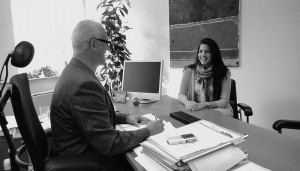Matthew R. Arnold of Arnold & Smith, PLLC answers the question “If I am injured in a car accident or at work what should I do?”
Seasoned attorneys—or those who were practicing law before the United States Supreme Court’s 1977 decision in Bates v. State Bar of Arizona—grit their teeth at the door that case opened.

Attorneys charge high by-the-hour fees because the work they perform on behalf of clients is often specialized, so detailed and requiring such training and experience that no one else—literally—can perform it. In personal injury cases, however, most attorneys make an exception to the standard, by-the-hour billing practice. Instead of asking their clients to pay them on a regular basis for work expended on a case as the case progresses, attorneys work on a “contingency” basis—that is, attorneys do not bill and collect fees from clients during the pendency of a case but instead collect a percentage of the award to a client if a case settles or if—after a trial—a judge or jury makes an award to a client. If no settlement or award is made, the attorney—like the client—gets nothing.
In order to win a personal-injury case, a lawyer must prove that the at-fault party (the defendant) was at fault, or caused the injury to the lawyer’s client through negligent or intentional conduct. Oftentimes a defendant will argue that he or she was not at fault and will hire a lawyer to defend him or her. Or, as is common in accident cases, the defendant had a policy of insurance in effect at the time of the accident, and the insurance company hires a lawyer to argue that the defendant was not at fault and to otherwise defend against the claim.
Proving fault often involves amassing evidence through a labor-intensive investigation that involves time-consuming, effort-heavy and costly discovery mechanisms like depositions. In complicated cases, the cost of transcripts for depositions alone can run into the tens-of-thousands of dollars.
The process of proving a case can be “slow, costly, cumbersome, and unpredictable,” writes Nora Freeman Engstrom in an article published in the October 2011 edition of the New York University Law Review, titled “Sunlight and Settlement Mills.” At the end of the process is a jury, charged with determining who was at fault and the amount of damages to be paid, if any, to an injured party.
Since most attorneys take personal-injury claims on a “contingency” basis—meaning the attorney gets a percentage of the jury award or settlement, if any—the attorney can only take a case that promises a large return. Up-front legal costs—the costs associated with filing lawsuits, taking depositions, and securing expert witnesses who may charge tens of thousands of dollars for service and testimony—further complicates the process, as attorneys and clients must determine who will foot the bill for those costs, which may never be recouped.
What that means, in practical terms, is that attorneys must be extremely selective when considering taking on new cases. In general, busy personal-injury attorneys who litigate contested cases choose only high-value cases or cases in which liability is uncontested. Where liability is contested, an attorney must be convinced that, at a minimum, he or she has a compelling argument to make to a jury regarding the fault of a defendant in a case.
If you or someone you know has any questions regarding potential personal injury claims, feel free to contact the experienced personal injury attorneys at Arnold & Smith, PLLC in Charlotte, North Carolina for a free consultation. Call toll free at (955) 370-2828 or click here for additional resources.
Part 2:
Settlement Mills II: Slick advertising draws in pool of underserved legal clients
About the Author
Mr. Arnold was raised in Charlotte, where he graduated from Providence Senior High School. He attended Belmont Abbey College, where he graduated cum laude, before attending law school at the University of North Carolina at Chapel Hill on a full academic scholarship.
A board-certified specialist in the practice of Family Law, Mr. Arnold is admitted to practice in all state courts in North Carolina, in the United States Federal Court for the Western District of North Carolina, in the North Carolina Court of Appeals and Supreme Court, and in the Fourth Circuit United States Court of Appeals in Richmond, Virginia.
In his free time, Mr. Arnold enjoys golfing and spending time with his wife and three children.
Sources:
http://www.charlestonlaw.net/personal-injury-lawyer-charleston/
Image Credit:
http://commons.wikimedia.org/wiki/File:Jochen_Vomhof_im_Mandantengespr%C3%A4ch.jpg
See Our Related Video from our YouTube channel:
https://www.youtube.com/user/ArnoldSmithPLLC/videos
See Our Related Blog Posts:

